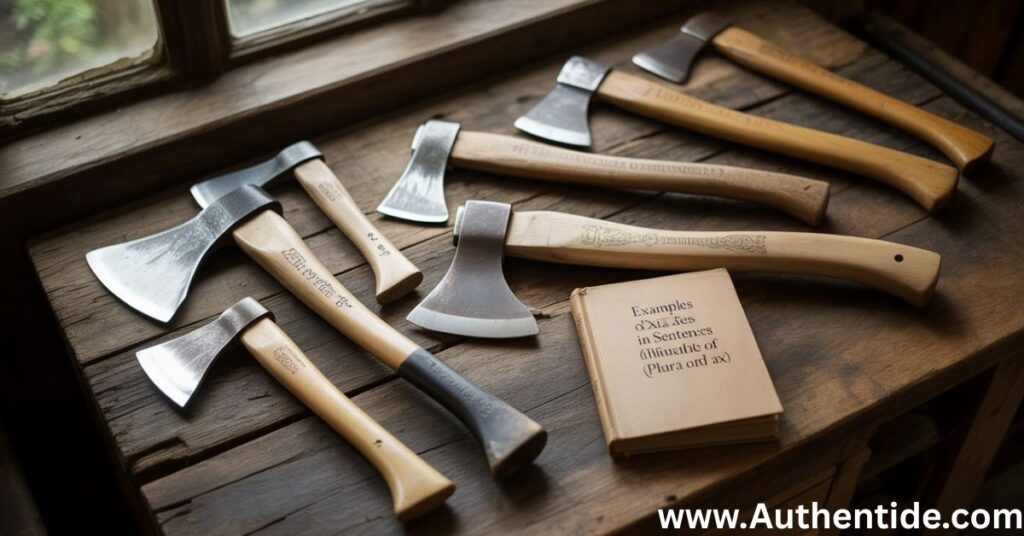The plural of axe is something that stumps even native English speakers. Is it axes or axen? While the latter may sound right to some ears—perhaps due to older irregular plural forms like oxen—it’s not correct. In modern English, “axes” is the proper plural form of “axe”, whether you’re talking about tools or grammatical terminology.
Let’s face it: English can be sneaky. Words that end in “-x” often bend the rules. But when it comes to the plural form of axe, there’s a clear rule rooted in standard grammar. In this article, we’re going to explore why “axes” is correct, where the confusion around axen comes from, and provide real-life examples, including email and messaging scenarios, that clarify its use.
By the end, not only will you know the correct plural of axe, but you’ll also understand how to use it confidently in both writing and conversation. So whether you’re drafting a formal document, writing an email to your team, or just sharpening your language skills—this guide has you covered.
What is an Axe?
An axe is a tool with a heavy-bladed head mounted crosswise on a handle. Traditionally used for chopping wood, it’s also been symbolic in battle, mythology, and even business lingo (“getting the axe”).
Here’s how you might see it used in context:
Email Example
Subject: Tool Request for Maintenance TeamHi Marcus,
Please ensure each maintenance station is equipped with an axe by the end of the week. We’ll need them for the upcoming tree trimming project.
Thanks,
Nora
Notice the phrase “an axe“? Not a axe. Since axe begins with a vowel sound, “an axe” is grammatically correct. If you’ve ever wondered whether to say a axe or an axe, this settles it: always “an axe.”
Origins of the Word “Axe”
The word axe has deep roots. It comes from the Old English “æx” or “eax,” which in turn traces back to Proto-Germanic and Proto-Indo-European roots. This linguistic lineage is similar to other ancient tools whose names have remained relatively unchanged.
While some may imagine that axen could stem from these old forms, English grammar has evolved. Just like we moved from knif to knife, we also cleaned up our plural rules—leaving behind words like axen as historical artifacts, not active vocabulary.
Plural of Axe: Why It’s Axes, Not Axen
Now, let’s get to the heart of the matter: is it axes or axen?
The answer is straightforward. The correct plural of axe is “axes.”
Why? Because the rule in English is that nouns ending in “-x” typically take “-es” to become plural.
Think of these examples:
| Singular | Plural |
|---|---|
| box | boxes |
| fox | foxes |
| tax | taxes |
| axe | axes |
Adding “es” is part of the standard English rule for making words ending in “x” plural. That makes “axes” the correct plural, while “axen” is never used in modern English.
Quick Message Example:
Hey Claire, make sure we bring both axes for the camping trip. One might not be enough for firewood.
See how natural that sounds? “Axes” fits right in. “Axen” would feel out of place.
Some Nouns Ending in “-x” and Their Plurals

Let’s look at more words that follow the axe plural English rule to strengthen the concept:
- Index → Indexes (or indices in math)
- Appendix → Appendices (in academic use)
- Phoenix → Phoenixes
Although some -x ending nouns have Latin-style plural forms, “axe” is not one of them. It sticks to the standard plural: axes.
This table summarizes the differences:
| Word | Correct Plural | Notes |
|---|---|---|
| Axe | Axes | Tool or weapon |
| Axis | Axes | Grammatical/Mathematical use |
| Index | Indexes/Indices | Context-dependent |
| Appendix | Appendices | Academic/medical term |
And yes, even though axis and axe share the same plural spelling—axes—they are entirely different in meaning and pronunciation.
Axe or Ax: What’s the Difference?
Here’s where regional variation steps in.
- “Axe” is the British English spelling.
- “Ax” is the American English variant.
So, if you’re reading a novel from the UK, you’ll likely see axe. In a U.S. instruction manual? You’ll find ax.
American English Example:
Jason grabbed an ax from the shed and headed toward the woods.
British English Example:
Liam carried his axe over his shoulder, ready for a long day of chopping.
Regardless of spelling, the plural form remains “axes.” Never “axen.”
Examples of “Axe” in Sentences
- I found an axe lying under the porch.
- Do you know how to sharpen an axe properly?
- He used an axe to break through the ice.
Email Snippet:
Hi Lauren,
Can you order an axe for the farm crew? The old one broke last week.
Thanks,
Doug
Examples of “Ax” in Sentences
- The ax was too dull to cut the log.
- He swung the ax with impressive strength.
- Please bring the ax from the basement.
Text Example:
Don’t forget the ax for our wilderness survival class tomorrow!
Examples of “Axes” in Sentences (Plural of Axe and Ax)

- We brought two axes for the hike—one for each person.
- The blacksmith displayed several handcrafted axes in his shop.
- Their shed had a row of gleaming axes hanging on the wall.
Professional Email Example:
Subject: Safety Equipment InventoryHi Henry,
Please confirm if we still have the five axes in stock. The forestry team needs them by Thursday.
Regards,
Amelia
Synonyms of “Axe”
Depending on context, you might swap axe with:
- Hatchet
- Chopper
- Battle-axe (for historical references)
- Cleaver (in culinary contexts)
- Tomahawk (in cultural or historical contexts)
But for clarity in most situations, “axe” remains the most universally understood term.
Pro Tips (Most Important Paragraph Breakdown)
The “Plural of Axe: Why It’s Axes, Not Axen” section is the most essential part of this article.
- It clarifies the grammatical rule: adding “-es” to nouns ending in “-x.”
- It directly answers the search intent behind queries like “is it axes or axen?”
- It addresses user confusion with examples and comparisons.
- It strengthens SEO with key phrases like plural of axe, axe vs axen plural, and why axen is wrong—organically, not forcefully.
If you want your content to rank well and help readers immediately, make this section tight, accurate, and rich in examples.
Conclusion
So, what’s the correct plural of axe? It’s axes—every time. Not axen, not axses, and certainly not axe’s. If you ever hear someone say otherwise, now you’ve got the grammar, history, and examples to gently steer them in the right direction.
Language evolves, sure—but when it comes to the plural axe, the rule is firm and straightforward. Whether you’re chopping wood, writing a fantasy novel, or managing forestry equipment, stick with axes and leave axen in the medieval fantasy section.

Your go-to place for smart synonyms and celebrity updates. Muhammad Hassan Abid is dedicated to creating useful, engaging content that informs, inspires, and truly serves your curiosity

